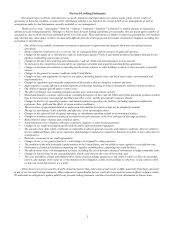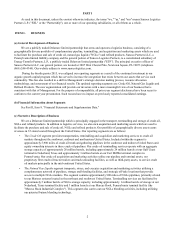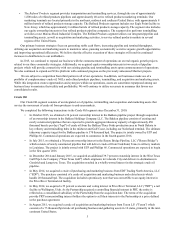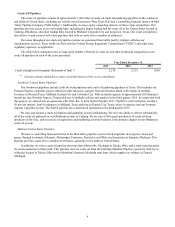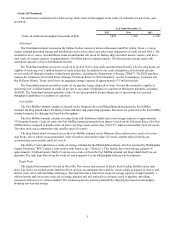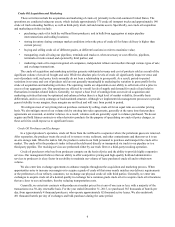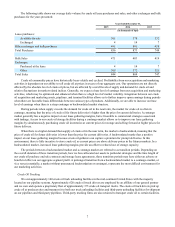Sunoco 2015 Annual Report Download - page 13
Download and view the complete annual report
Please find page 13 of the 2015 Sunoco annual report below. You can navigate through the pages in the report by either clicking on the pages listed below, or by using the keyword search tool below to find specific information within the annual report.
11
Refined Products Terminals
Our active refined products terminals receive refined products from pipelines, barges, railcars, and trucks and distribute
them to third parties and certain of our affiliates, who in turn deliver them to end-users and retail outlets. Terminals play a key
role in moving product to the end-user markets by providing the following services: storage; distribution; blending to achieve
specified grades of gasoline and middle distillates; and other ancillary services that include the injection of additives and the
filtering of jet fuel. These terminals facilitate the movement of refined products to or from storage or transportation systems,
such as a pipeline, to other transportation systems, such as trucks or other pipelines. Of our approximately 40 refined products
terminals, each facility typically consists of multiple storage tanks and is equipped with automated truck loading equipment that
is operational 24 hours a day. This automated system provides controls over allocations, credit, and carrier certification.
Our refined products terminals derive revenues from terminalling fees paid by customers. A fee is charged for receiving
products into the terminal and delivering them to trucks, barges, or pipelines. In addition to terminalling fees, our refined
products terminals generate revenues by charging customers fees for blending services, including certain ethanol and biodiesel
blending, injecting additives, and filtering jet fuel. Our refined products pipelines provide supply to the majority of our refined
products terminals, with third-party pipelines and barges supplying the remainder.
The table below summarizes the total average daily throughput for the refined products terminals in each of the years
presented:
Year Ended December 31,
2015 2014 2013
Refined products terminals throughput (thousands of bpd) 534 497 525
The following table outlines the number of active refined products marketing terminals and storage capacity by state:
State Number of Terminals Storage Capacity
(thousands of barrels)
Indiana 1 206
Louisiana 1 161
Maryland 1 710
Massachusetts 1 1,144
Michigan 3 760
New Jersey 3 650
New York (1) 4 920
Ohio 7 957
Pennsylvania 13 1,743
Texas 4 548
Virginia 1 403
Total 39 8,202
(1) We have a 45 percent ownership interest in a terminal at Inwood, New York and a 50 percent ownership interest in a terminal that
we operate in Syracuse, New York. The storage capacities included in the table represent the proportionate share of capacity
attributable to our ownership interests in these terminals.
Eagle Point
In additional to crude oil service, the Eagle Point terminal can accommodate three marine vessels (ships or barges) to
receive and deliver refined products to outbound ships and barges. The tank farm has a total active refined products storage
capacity of approximately 6 million barrels, and provides customers with access to the facility via barge, pipeline and rail. The
terminal can deliver via barge, truck or pipeline, providing customers with access to various markets. The terminal generates
revenue primarily by charging fees based on throughput, blending services and storage.


